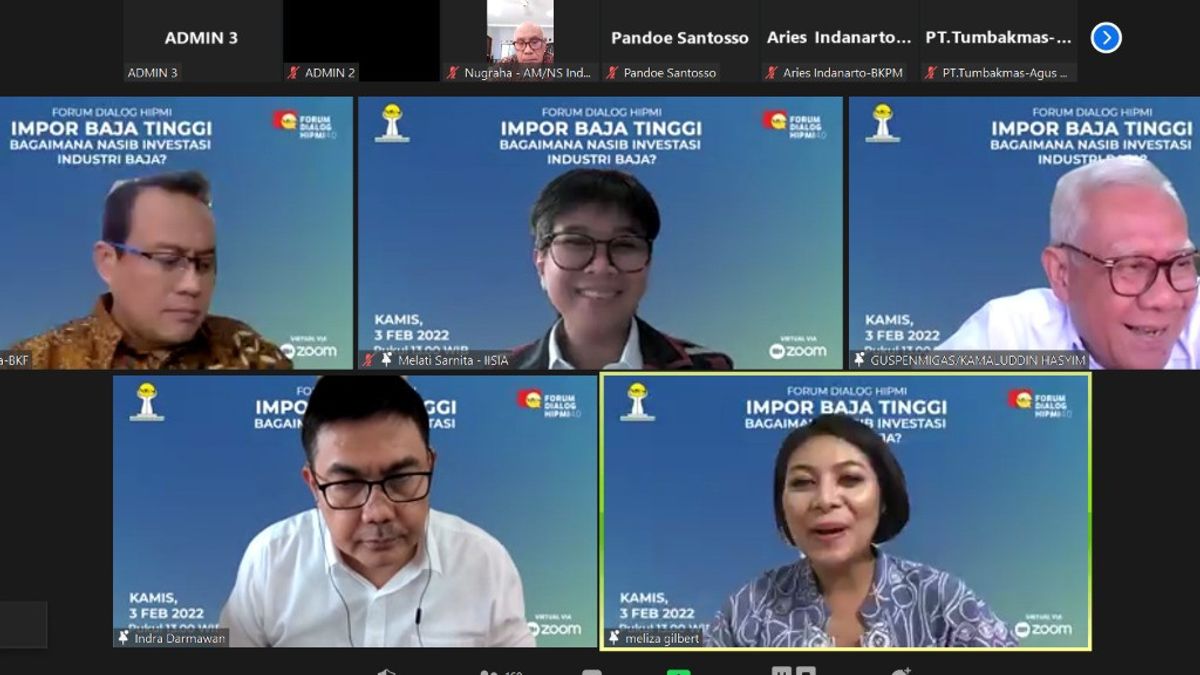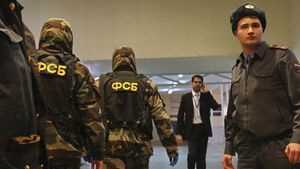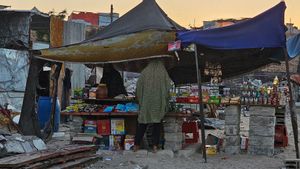JAKARTA - Domestic business players have complained about the increase in the volume of steel imports last year. Based on data from the Central Statistics Agency (BPS), a 23 percent increase in steel imports from 3.9 million tons in 2020 to 4.8 million tons in 2021.
This data underlies the holding of the Indonesian Young Entrepreneurs Association (HIPMI) dialogue forum with The Indonesian Iron & Steel Industry Association (IISIA) to discuss the future of investment in the Indonesian Steel Industry.
In the introduction to the discussion, the General Chair of the Banking and Finance Division of BPP HIPMI, Anggawira, said that the challenges of the national steel investment sector must be taken seriously. HIPMI regrets the flood of imported steel products, because this will certainly damage the market structure in Indonesia, and have a negative impact on the investment climate where investment in the steel industry in Indonesia becomes unattractive.
"If investment stagnates, it will hinder the implementation of the construction of the 10 million ton Cilegon Steel Industry Cluster which has been launched by the government and is targeted for completion in 2025," said Anggawira who is also the Investment Committee at the Ministry of Investment/BKPM RI on Thursday, February 3.
The investment in the steel industry that has been invested by both domestic and foreign investors to date has reached 15.2 billion US dollars or equivalent to Rp. 215 trillion. This figure is a very large investment value, but it is a pity that steel imports are not maintained properly, so that even looking for profits on this investment for a return on investment will certainly be difficult.
Deputy Chairman of KADIN for Industry, Bobby Gafur Umar conveyed the sad condition, namely the current average utilization of national steel producers only reached 40 percent, ideally 80 percent, this figure is not too good compared to other industries, for example ceramics. With a utilization rate of only 40 percent, investors in the steel industry will certainly think twice.
"Other things, import attacks are also carried out in various ways by traders, therefore KADIN hopes that the government consistently applies existing regulations, especially to control imports and maintain invested investments," said Bobby.
In line with this opinion, the Chair of the National Iron and Steel Industry Association (IISIA) Flat Product Cluster, Melati Sarnita, said that the steel industry is still faced with a major problem, namely high steel imports.
"The problem that occurs from the increase in imports is that imports fill the market share filled by domestic steel products, thereby reducing the level of utilization of the domestic steel industry which is currently still low at only 40 percent on average. There are indications that many domestic markets are being carried out by unfair trade methods, such as dumping and circumvention (transfer of tariff posts),” said Melati Sarnita who is also the Commercial Director of PT Krakatau Steel.
Melati Sarnita also conveyed the practice of importing steel which has disrupted the stability of the domestic steel industry and the efforts that have been made to anticipate it.
"The trend is that imports are still being carried out unfairly, both with dumping prices (predatory pricing) and the practice of transferring the HS code from carbon steel to alloy steel (circumvention). We have submitted the application for the imposition of Anti-Dumping Import Duties (BMAD) or Safeguard Measures (BMTP), both the extension and the new ones. We hope that the government can implement a trade remedies policy like other countries have done," said Melati in response to questions. one of the participants in the discussion.
In closing, Melati also added that related to other trade security efforts, namely technical barriers to stem the rush of imported products, including the mandatory application of the Indonesian National Standard (SNI) for steel products from upstream to downstream which must be immediately implemented by the relevant Ministries as well as encouraging the fulfillment of the Domestic Component Level. (TKDN) by paying attention to the material side of government projects.
Djaka Kusumartata as a representative of the Fiscal Policy Agency of the Ministry of Finance conveyed the good news that one of the imposition of BMAD for Hot Rolled Coil (HRC) Alloy Products proposed by national steel producers is currently in the position of issuing a Minister of Finance Regulation (PMK) by the Minister. Finance.
The government representatives who attended were Dr. Indra Darmawan (Ministry of Investment) and Djaka Kusumatarta emphasized the steps that have been taken by the government to encourage investment growth in the steel industry.
Both Indra and Djaka agreed that the forum, which was held at noon, was a very useful forum for listening to input from the business sector so that the government could provide legal certainty.
The English, Chinese, Japanese, Arabic, and French versions are automatically generated by the AI. So there may still be inaccuracies in translating, please always see Indonesian as our main language. (system supported by DigitalSiber.id)













